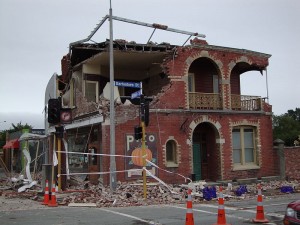NZ Quake Rocks Bermuda Reinsurer Shares
 Bermuda reinsurers will experience aftershocks from the 6.3-magnitude earthquake which devastated parts of the New Zealand city of Christchurch yesterday [Feb.21], killing more than 60 people.
Bermuda reinsurers will experience aftershocks from the 6.3-magnitude earthquake which devastated parts of the New Zealand city of Christchurch yesterday [Feb.21], killing more than 60 people.
“It is just a scene of utter devastation,” New Zealand’s Prime Minister John Key said. “We may well be witnessing New Zealand’s darkest day.”
CBS News reports that: “Sidewalks and roads were cracked and split, while thousands of dazed, screaming and crying residents wandered the streets as sirens and car alarms blared. Ambulance services were overwhelmed, and some victims clutching bleedings wounds were carried to private vehicles in makeshift stretchers fashioned from rugs or bits of debris.”
“Christchurch Mayor Bob Parker declared a state of emergency and ordered people to evacuate the city center. He said it was impossible to say how many people were trapped in the rubble, but that it was estimated to be more than 100.”
Billion dollar losses are again expected from the second quake to hit the city in recent months — and shares in Bermuda reinsurers fell on the New York Stock Exchange this morning as the scale of the New Zealand disaster became clearer.
Shares in ACE Ltd fell 1.5 percent in early trading, XL Group dropped 1.7 percent, PartnerRe Ltd fell 2.2 percent and Everest Re Group lost 1.6 percent.
The island is home to 16 of the world’s top 35 reinsurers and Bermuda writes 16 percent of aggregate global reinsurance premiums.
Modelling firm Eqecat told industry trade publication “Insurance Insider” the Christchurch quake would cost at least $1 billion in a very early assessment of potential losses.
And Oriel Securities analysts predicted that based on a similar $4-$5 billion industry loss from the previous earthquake, the impact on reinsurance pricing from the latest disaster was still likely to fall within that region.
While less intense than the 7.1-magnitude earthquake which rocked the South Island city on September 4, this week’s event caused more damage. And while the September quake seriously injured two people, there were no fatalities.
“It seems likely that the market loss will be larger than the September quake,” Mark Williamson, a London-based analyst at Peel Hunt, wrote in a note to clients today.
Bermuda-based specialty insurer and reinsurer Catlin – which is a major reinsurance provider in New Zealand — had to revise up their initial estimates from the September earthquake as the government-backed Earthquake Commission, a disaster relief fund which purchases reinsurance from Lloyd’s, raised its loss estimate . Other Bermuda reinsurers which saw their 2010 earnings blunted by the September Christchurch quake include Platinum Underwriters Holdings, Ltd , Partner Re, Aspen Insurance Holdings Ltd. and Flagstone Reinsurance Holdings Ltd.
Meanwhile the “New Zealand Herald” newspaper is reporting Christchurch homes and businesses under-insured for the September’s earthquake will be particularly hard-hit by the new disaster.
“The September quake revealed massive complaints over loss of profits and business interruption insurance, especially for the retail sector, and these problems will rear their ugly head again,” insurance broker John Sloan told the paper.
Major earthquake insurance premium increases “will become a reality,” added the Wellington insurance broker.
He said many companies didn’t realise that the earthquake claims deductible (excess) “had changed to be a percentage of the total sum insured on the buildings, contents, loss-of-profits cover at the same site and the all-up deductible was very costly.”
In addition, many homeowners and businesses would either not have renewed or increased their insurance after the September quake, while they awaited policy renewals to be actioned.
New Zealand Insurance Council chief executive Chris Ryan said it was “just too early to tell” what the eventual cost of today’s earthquake would be.
“It’s very hard to be able to predict,” he told the “Herald”. “About 25 per cent of our claims had been resolved, and we were getting ready for the rebuild — there was a real feeling of optimism as though things were moving forward, and that’s going to be reassessed at the very least.”
Mr. Sloan said the Earthquake Commission may have to liquidate more of its investments to help fund repairs, while private insurers would face further calls on their reinsurance arrangements.
“If their reinsurance has a more limited reinstatement provision, they, as original insurers, may face some cash-flow difficulties as they call on reserves,” he said.

